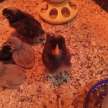Can I Ask Why?
Guess not ...

My parents appeared appalled that I would have the audacity to question the Doctor. Served them right, as they were the people responsible for setting up this trick.
They had led me to believe my presence in attending my Dad’s annual neurology examination would be helpful and appreciated, given my background and affinity for asking questions. I should have known it was a ruse, as they despised me asking questions – especially of experts. They rarely questioned anything.
When we got to the appointment, my Dad went through the routine battery of tests with the Doctor of Neurology, confirming that he still had the same genetic condition, it was progressing as expected and there was still nothing more to be done.
Then it was my turn. What? I didn’t want or need a diagnosis – I already knew I was affected with the same and there was no medicine or any known way to improve it. But I obliged and hopped up on the exam table to perform a few of the tests. (The doctor had to have agreed to the plot, also.) The diagnosis of SCA was noted, but unofficial. I didn’t even WANT a diagnosis at this time, as the only thing it could provide is a potential for screwing up my ability to keep or get health insurance.
I had questions. I asked.
The Doctor looked down his stupid nose at me. I could see his mind working as his eyes narrowed. ‘How dare you! A mere paeon of a mortal questioning me!’ (These are the unexpressed words I could see shooting from his eyes.)
He said, “No. That’s not how it works.”
So, I asked “Why not?” as my left eyebrow raised.
He just turned on his heel and left the room.
That was my first experience trying to understand the potential of Neuroplasticity, though I didn’t have a word for the concept yet. (That experience also did not improve my opinion of doctors.)
I did subsequently get an official diagnosis many years later from a neurologist I chose and saw several times. I liked him. He understood the condition, it’s progression and it’s impacts. He seemed impressed by my abilities despite the disease and encouraged me to keep on as I was. He retired after only a few check-ups annually, and I have yet to find a new doctor – general or neuro – that I feel comfortable with. It seems that if they can’t prescribe a med, they have no time for you, and questions really make them squirm.
After asking my “whys” and “why-nots” for 50+ years, you’d think my parents would be used to it, but they are not. It still seems to make them flustered and ashamed and even angry. I still don’t understand why my questioning is so bothersome to people in general. I mean. How am I supposed to discover or correct misinformation for myself if I am not allowed to ask questions? I guess it’s as simple as realizing people are afraid to be wrong and with self-reflection. I am not.
If I can’t be wrong, how can I ever actually be right?
****************************************************************
Definition of Spinocerebellar Ataxia (SCA):
Some science-y stuff, but I’ll try to keep it short and sweet as I understand it, hopefully expressed in a way that you can relate to it, or relate it to me or my story, or to someone you know. This is far from the only genetic condition inherited like this.
Your individual genetic code is passed down to you from your parents. You have an equal chance of inheriting genes from both, but you will inherit 50% from each parent, adding up to your 100% unique genetic code. It’s a game of chance as to the combination you get. Some genes will overpower others – this is called dominance. Some genes only become apparent when copies of a particular gene are received by both parents – this is recessive. There is also idiopathic, where the gene is expressed, but its origin is unknown. That’s the understood version of how it has come to be in me – my parent had it and it was determined to be idiopathic, but dominant, so now I have it and there is a 50% chance that it will be passed on to my offspring, but we know the origin, which also lends us a bit of predictability for the future in its expression, anticipation and symptoms.
You may be interested in reading more about the state of “things” currently:
About the Creator
KJ Aartila
A writer of words in northern WI with a small family and a large menagerie.
My Substack
Reader insights
Nice work
Very well written. Keep up the good work!
Top insights
Excellent storytelling
Original narrative & well developed characters
Eye opening
Niche topic & fresh perspectives
Heartfelt and relatable
The story invoked strong personal emotions






Comments
KJ Aartila is not accepting comments at the moment
Want to show your support? Become a pledged subscriber or send them a one-off tip.